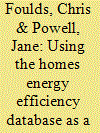| Srl | Item |
| 1 |
ID:
150879


|
|
|
|
|
| Summary/Abstract |
Fuel poverty and cold housing constitute a significant public health problem. Energy efficiency interventions, such as façade retrofitting, address the problem from a structural and long-term perspective. Despite evidence of the health benefits of insulation, little is known about the political and social contexts that contribute to social inequalities in receiving and experiencing health benefits from these interventions. We used a realist review methodology to better understand the mechanisms that explain how and why variations across different social groups appear in receiving energy efficiency façade retrofitting interventions and in their impact on health determinants. We considered the four stages of the policy implementation framework: public policy approach; policy; receiving intervention and impact on health determinants. We found strong evidence that certain social groups (low-income, renters, elderly) suffering most from fuel poverty, experience more barriers for undertaking a building retrofitting (due to factors such as upfront costs, “presentism” thinking, split incentives, disruption and lack of control), and that some public policies on housing energy efficiency may exacerbate these inequalities. This can be avoided if such policies specifically aim at tackling fuel poverty or social inequities, are completely free to users, target the most affected groups and are adapted to their needs.
|
|
|
|
|
|
|
|
|
|
|
|
|
|
|
|
| 2 |
ID:
132642


|
|
|
|
|
| Publication |
2014.
|
| Summary/Abstract |
In devising viable energy efficiency policies that can reduce the greenhouse gas emissions of existing dwellings (e.g. UK×s Green Deal), data are required on current insulation levels and its influences. One such data source is the seldom used UK Energy Saving Trust×s Homes Energy Efficiency Database (HEED), which this paper investigates using Norfolk UK local authorities as a case study. The HEED×s reactive and longitudinal data collection strategies contribute to underlying biases, which is the likely reasoning for its differences with the English Housing Survey and UK 2001 Census. These differences had a cascading effect in that they manifested themselves in the indicative financial and carbon assessments undertaken. Similarly, sampling concerns also implicated correlations surrounding influences of current dwelling insulation levels. Providing one is transparent about potential biases and data concerns, the HEED can play a substantial role in guiding policy decisions and understanding dwelling stock characteristics (e.g. what makes dwellings 'Hard to Treat×). In particular, its vast (national) geographic coverage yet high resolution enables local context to be explored: a factor that this study shows to significantly shape insulation levels.
|
|
|
|
|
|
|
|
|
|
|
|
|
|
|
|